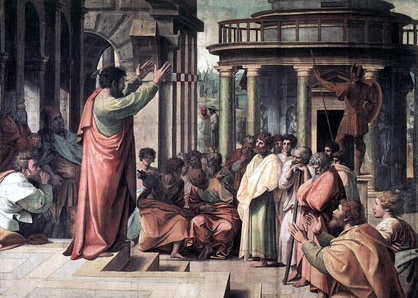C
-C-
Caesarea
Port city and provincial capital of the Roman province of Judea.
Herod built a spectacular man-made harbor with two breakwaters
to link the country with world commerce.
Caesarea Philippi
Large Hellenistic city rebuilt and renamed by Philip the
Tetrarch. Located on Mount Hermon in the upper Jordan Valley
near the spring of Panias, one of the three headwaters of the
Jordan River, and the site of a great pagan temple dedicated to
Pan, the Roman fertility god.
Caiaphas
A high priest of the Jews who presided over the assembly that
condemned Jesus to death. (Matt. 26).
Caldarium
Hot room in Roman baths.
Calvary
Golgotha, the place where Jesus was crucified (Luke 23:33).
Canaan
Old Testament name for the Promised Land. It means land of
purple, referring to the color of the dye produced from
shellfish along Canaans coast. Canaan is at the eastern end of
the Mediterranean Sea where Asia, Europe, and Africa come
together.
Canaanite
The word originally meant merchant or trader. Eventually it
came to refer to the people of the region.
Capital
The topmost part of a column.
Caravenserai
Courtyard with rooms for lodging.
Ceres
Roman god of earth. Daughter of Cronus and Rhea.
Caryatid
Column in the form of a female figure.
Cella
The great hall of a temple which contained the cult statue.
Central mountains
Region made up of three mountain ranges: Hebron in the south,
Judea in the center, and Samaria in the north.
Centurion
An officer in the Roman army in charge of 100 soldiers.
Cherem
Hebrew word meaning totally given to the Lord, often through
destruction. Only Gods judgment could reclaim anything placed
under this curse.
Christ
The title of Jesus that means "annointed" or "chosen one" in
Greek. The Hebrew word is "Messiah." Jesus Christ is God's
chosen one to bring salvation to his people.
Church
A group of the followers of Jesus that meets in a certain place.
Jesus calls the church his body. Most of the books of the New
Testament are letters to churches.
Cistern
Because water in Israel is hard to come by, most ancient cities,
towns, and even households used cisterns to catch and store rain
runoff from rooftops, courtyards, and even streets. Cisterns
were dug by hand out of solid rock and were plastered so they
would hold water. They needed constant care because the plaster
tended to fall off, which allowed the precious water to leak
out. When a cistern failed to hold water, it created a desperate
situation for the people who depended on it.
City Gates
During Biblical times, city gates protected the entrance to the
city and functioned as the center of city life. In various
chambers inside the gatehouse, people paid their taxes, settled
legal matters, and even met the king. The city gates also
provided a gathering place for prophets, kings, priests, judges,
and other city leaders.
City Refuge
A place of safety for people who had accidentally killed someone
(Deut. 19:1-21
Coastal Plain
Flat, fertile area of Israel along the Mediterranean Sea that
comprises the Plain of Sharon in the north and Philistine
territory in the south.
Colonnades
Rows of columns spaced evenly apart that support arches or a
roof. First-century Roman streets often had colonnades on both
sides.
Commandment
A rule or teaching that people should obey. God gives his people
commandments to help them live a good life.
Aphrodite
Greek god of love and beauty. Daughter of Zeus and Dione (or did
she spring from foam in the sea?)
Copper Scroll
One of the Dead Sea Scrolls, etched on copper, claiming to
identify a great treasure that had been hidden before the Temple
was destroyed.
Covenant
An agreement or set of promises made between two parties. When
forming a covenant in ancient days, two parties gathered
animals, cut each into two parts, and then placed them on the
ground so their blood flowed into one stream. Each party walked
through the blood, symbolizing that they would pay with their
life if they broke the terms of the covenant. God made his
covenant with Abram in this familiar way. But instead of making
Abram walk the blood path, God, in the form of a blazing torch,
walked through the path for him. Knowing Abram couldnt keep his
end of the covenant, Gods actions effectively said, If either
you or I break this covenant, I will pay for it with my own
blood (Gen. 15). Jesus fulfills this covenant promise.
Creation
God created, or made, the world and the entire universe; it is
all his creation. The Bible says every-thing God made was very
good. All creation is now hurt by the sin in the world. But one
day God will make creation perfect again.
Creche
Nativity scene.
Crucify
To nail or tie a person to a cross until that person died. A
cross was made of rough beams of wood nailed together in a "t"
shape. Jesus died by this method, which was usually used for
criminals.
Curse
To wish that bad things happen to someone or something. God
curses, or makes bad things happen, only as a punishment or not
obeying him.


